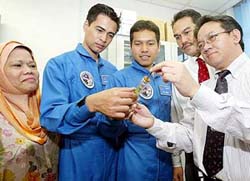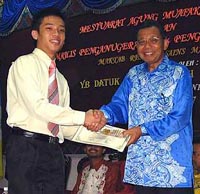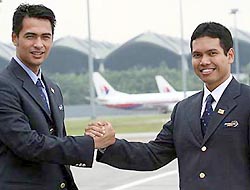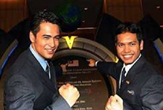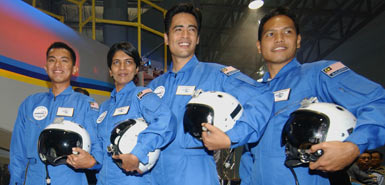Topic: - The Experiments
KUALA LUMPUR: Most Malaysians think it is a waste of time and money to send a fellow countryman into space, programme director of the national astronaut programme, Col Dr Zulkeffeli Mat Jusoh said.
"Worse, many are still under the assumption that we are going to spin gasing or make teh tarik in space."
|
SCIENTIFIC GEAR: (From left) UKM Medical Molecular Biology Institute (UMBI) Senior Consultant Prof Dr Ramelah Mohamed, Dr Sheikh Muszaphar Shukor, Dr Faiz. Dr Zulkeffeli and UMBI director Prof Dr A. Rahman A. Jamal looking at the fluid-processing apparatus which will be used to store and study cancer cells and bacteria microbes. |
"Nothing could be further from the truth," he told a press conference here yesterday.
"Our objective is to uncover monumental findings in the field of science and many countries, including the United States and Russia, are eager to see the results of our experiments," he added.
Present at the press conference were space trainees Dr Sheikh Muszaphar Sheikh Shukor and Dr Faiz Khaleed.
One of them will be the first Malaysian astronaut and will go into space on an international mission, starting on Oct 10.
Lamenting that most Malaysians do not take the programme seriously, Dr Zulkeffeli said:
"A recent survey revealed that they still think it’s a waste of time and money, and that we’re just going to undertake a 'little' science project when our angkasawan is sent into space."
He said our angkasawan would face a very regimented schedule in carrying out four major experiments.
These include studying liver cancer and leukaemia cells, bacteria and protein crystallisation and the physics of objects in space.
"Every single move and action of the angkasawan must be planned to the minute, as only 108 minutes per day can be allocated for carrying out the experiments."
"Our angkasawan will conduct these projects on the third day in space, due to logistics constraints."
"Clearly, we do not want to waste any time, as our findings could significantly change and contribute to the field of modern medicine, science and industry," said Dr Zulkeffeli.
Among the institutes that drew up the experiments and will supervise the programme are Universiti Kebangsaan Malaysia, Universiti Malaya, Universiti Teknologi Mara, Universiti Darul Iman and Universiti Putra Malaysia.
The others are the Malaysian Genome Institute, Aviation Medicine Institute, Sunway University College, Health Ministry and Malaysian Agriculture Research and Development Institute (Mardi).
The idea is to carry out the studies in a microgravity and space radiation condition, as both aspects have a significant impact on various organisms and biological systems.
Dr Zulkeffeli said the study of an object's physics in space, such as spinning a top (the source of the public's mockery on the experiment) is not to be misunderstood.
He said such experiments would help significantly in attracting the young to take notice of the world of science.
Source: News @ The Star Online

